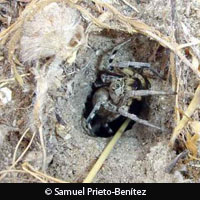Give spiders a break!
Spiders may be robust, and some may even be agile hunters, but they can be stopped in their tracks by their ... two-legged enemies. New research from Spain shows that arachnids are affected by changes to their environment that are triggered by human activity. The findings of the study are presented in the journal Biological Conservation. Investigating if spiders have the capacity to put up with human impact compared to other animals, the researchers from King Juan Carlos University (URJC) found that they cannot. 'The abundance and number of spider species is negatively affected by the impact of many human land uses, such as habitat fragmentation, fire and pesticides,' the Scientific Information and News Service (SINC) quoted co-authors Samuel Prieto-Benítez and Marcos Méndez from the Biodiversity and Conservation Department at URJC as saying. Through a meta-study of 173 scientific papers published over a 31-year period - that provided more generalisable data - the two researchers probed whether spiders remain untouched by the risks generated by Man. They focused on three ecosystems: farmland, pasture and woodland. 'The technique used meant we could rigorously combine the results of a lot of studies,' explain Drs Prieto-Benítez and Méndez. 'This is regularly used in medicine in order to arrive at general conclusions about the effects of drugs, based on numerous trials with more limited coverage.' Less than 2 in 20 studies about spiders and how they are affected by human activity have reported negative effects. In this latest study, the researchers provide 'evident' damaging effects on spider numbers, a result of the use of soil in farming and pasture systems. 'In woodlands this was not so clear,' the authors write. The researchers point out that fires, sheep-grazing and conventional crops, all part of the farming and pasture ecosystems, have an adverse effect on arachnid fauna because they trigger extreme changes to the vegetation structure. Habitat fragmentation impacts the abundance of spiders in woodlands. They add that using insecticides in farming also impacts spider diversity and pasture ecosystems negatively. Their data also indicate that organic farming is more beneficial to arachnid abundance than traditional agriculture. However, these effects are contingent on how complex the landscape is. The Spanish study offers a number of solutions for the conservation of spiders. The team says by cutting back on mechanical changes to the land, including grazing, ploughing and harvesting, spider diversity in both farming and pasture ecosystems would get a boost. They also suggest that the use of insecticides should be more controlled, as in organic farming, and that people should steer clear of habitat fragmentation. While spiders 'do not enjoy an excessive level of public sympathy', these creatures are a vital animal group for humans given that they 'free us' of a large number of pest insects and are 'very important' predators in the functioning of natural systems, the researchers say.For more information, please visit: King Juan Carlos University (URJC):http://www.urjc.es/version_ingles/Biological Conservation:http://www.elsevier.com/wps/find/journaldescription.cws_home/405853/description#description
Countries
Spain

